Grzegorz Marciniak: ''Melodica needs dedicated players who understand that it is a wind instrument and not a mini piano''
– When did you start to work with melodicas, and how did the series of Melodica Duets come about?
Grzegorz Marciniak: ''I started to work on these duets around Summer of 2018. I wanted to compose something solely for melodica or melodicas for some time, but I just didn't know how to go about it. Then in Spring of 2018 my Hohner Organa-30 broke down and while I was looking for a replacement instrument, I finally took a deeper dive into melodica. I wanted to compose something that could make listeners forget that what they hear is a melodica or melodicas. Music that would be gratifying to listen to, but also challenging and rewarding to play. I decided to write duets instead of solos for two reasons: firstly, I wanted to have a possibility to work with a continuous sound which I couldn't have with one melodica – circular breathing was something I did not want to use –, secondly, while recording myself and playing to it on another melodica, I discovered that two melodicas simply sound more interesting than one, small differences in tuning of the two instruments make the sound more spatial, more rich in overtones. Lastly, from the very beginning on, I thought that these duets needed to be written as a series of pieces. I was not sure if it should be two, three or more of them in one set, but finally decided about four as it gives a stronger formal feel. Classical if you like – like a symphony.''
– Growing up in Hungary in the first half of the 80s, the very first instruments I put my hands on were the cheap plastic melodicas, first the toy melodicas, later the more serious ones. And this is not only my unique case, but the first musical experience of a whole generation of young children who grew up in the early 80s. Did you have a similar experience in Poland? Do you remember your first encounter with the instrument?
Grzegorz Marciniak: ''In brief, my early encounters with melodica were not too promising. My first instruments were an upright piano, my sister's yamaha PSR 400, and later my bassoon. First time I ever played melodica was at a party during my studies in The Hague. For a long time I considered it a toy instrument and I didn't believe that you could make anything interesting with it. That was also the reason why over the years I grew irritated by the use of it in music I was interested in. Especially the ways it was being played there, usually by keyboard players without experience in playing wind instruments, resulting in poor sound quality production. But my attitude towards melodica has changed: now I consider it a full-fledged musical instrument capable of creating a unique and independent sound world. It just needs dedicated players who understand that it is a wind instrument and not a mini piano.''
Grzegorz Marciniak: ''I started to work on these duets around Summer of 2018. I wanted to compose something solely for melodica or melodicas for some time, but I just didn't know how to go about it. Then in Spring of 2018 my Hohner Organa-30 broke down and while I was looking for a replacement instrument, I finally took a deeper dive into melodica. I wanted to compose something that could make listeners forget that what they hear is a melodica or melodicas. Music that would be gratifying to listen to, but also challenging and rewarding to play. I decided to write duets instead of solos for two reasons: firstly, I wanted to have a possibility to work with a continuous sound which I couldn't have with one melodica – circular breathing was something I did not want to use –, secondly, while recording myself and playing to it on another melodica, I discovered that two melodicas simply sound more interesting than one, small differences in tuning of the two instruments make the sound more spatial, more rich in overtones. Lastly, from the very beginning on, I thought that these duets needed to be written as a series of pieces. I was not sure if it should be two, three or more of them in one set, but finally decided about four as it gives a stronger formal feel. Classical if you like – like a symphony.''
– Growing up in Hungary in the first half of the 80s, the very first instruments I put my hands on were the cheap plastic melodicas, first the toy melodicas, later the more serious ones. And this is not only my unique case, but the first musical experience of a whole generation of young children who grew up in the early 80s. Did you have a similar experience in Poland? Do you remember your first encounter with the instrument?
Grzegorz Marciniak: ''In brief, my early encounters with melodica were not too promising. My first instruments were an upright piano, my sister's yamaha PSR 400, and later my bassoon. First time I ever played melodica was at a party during my studies in The Hague. For a long time I considered it a toy instrument and I didn't believe that you could make anything interesting with it. That was also the reason why over the years I grew irritated by the use of it in music I was interested in. Especially the ways it was being played there, usually by keyboard players without experience in playing wind instruments, resulting in poor sound quality production. But my attitude towards melodica has changed: now I consider it a full-fledged musical instrument capable of creating a unique and independent sound world. It just needs dedicated players who understand that it is a wind instrument and not a mini piano.''
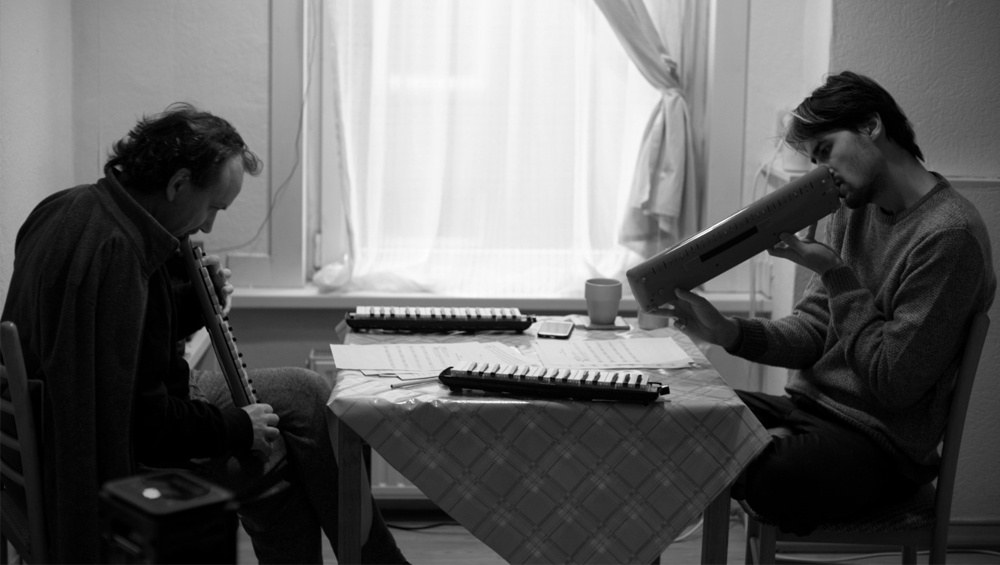
Rehearsal with Grzegorz Marciniak and Ábel Fazekas. Photo by Lam Lai
– In the sleeve notes of the release you mention the undeniable imperfection of the instrument: melodicas will not stay in tune for long, and the longer they are played, the more out-of-tune they become, so there is definitely a challenge in working with two or more melodicas. How do you relate to the unpredictability or the imperfection of the instrument?
Grzegorz Marciniak: ''I am simply going for what I think would sound good, taking into account the tuning imperfections. The idea is not to mock or imitate anything, but to endure these imperfections and turn it into qualities. Think of Scott Joplin's rags. They sound so good on a detuned piano, but they lose something when played on a perfectly in-tune Steinway. Same with an electric likembe used by bands like Konono Nº1. It sounds so great because of the tuning and distortion – organic and raw. So I take a cheap out-of-tune melodica as a sound-generating object and work on the music based on its characteristics. I am not trying to fit any arbitrary ideas onto it. The instrument itself generates ideas – the sound it makes. And that sound inspires the direction of a composition.''
– Melodica Duets are composed as a set of solo pieces that can be performed by two players, but the duets can also be performed alone, with pre-recorded accompaniment. In which setting the sound result works the best, and in which setting the process of playing is more inspiring?
Grzegorz Marciniak: ''Playing with another person is always more interesting. Every player is different and so is every performance. Fragments of these duets were performed already by an array of players and each one of them made the music sound differently. This is very inspiring. As about the settings, these duets can work acoustically in smaller spaces as well as amplified in larger ones. I prefer smaller ones because of the unbeatable intimacy they create, but I was also positively surprised how well Melodica Duets worked in a larger theater with an amplification. So in the end, because the music and the form of it are quite basic, the listener can dive into it safely regardless the setting.''
Grzegorz Marciniak: ''I am simply going for what I think would sound good, taking into account the tuning imperfections. The idea is not to mock or imitate anything, but to endure these imperfections and turn it into qualities. Think of Scott Joplin's rags. They sound so good on a detuned piano, but they lose something when played on a perfectly in-tune Steinway. Same with an electric likembe used by bands like Konono Nº1. It sounds so great because of the tuning and distortion – organic and raw. So I take a cheap out-of-tune melodica as a sound-generating object and work on the music based on its characteristics. I am not trying to fit any arbitrary ideas onto it. The instrument itself generates ideas – the sound it makes. And that sound inspires the direction of a composition.''
– Melodica Duets are composed as a set of solo pieces that can be performed by two players, but the duets can also be performed alone, with pre-recorded accompaniment. In which setting the sound result works the best, and in which setting the process of playing is more inspiring?
Grzegorz Marciniak: ''Playing with another person is always more interesting. Every player is different and so is every performance. Fragments of these duets were performed already by an array of players and each one of them made the music sound differently. This is very inspiring. As about the settings, these duets can work acoustically in smaller spaces as well as amplified in larger ones. I prefer smaller ones because of the unbeatable intimacy they create, but I was also positively surprised how well Melodica Duets worked in a larger theater with an amplification. So in the end, because the music and the form of it are quite basic, the listener can dive into it safely regardless the setting.''
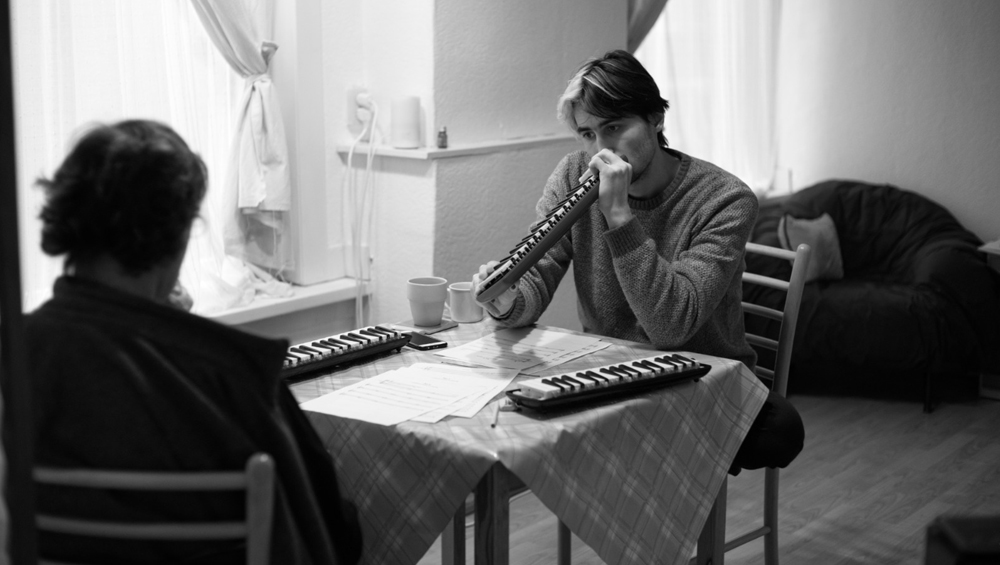
Grzegorz Marciniak and Ábel Fazekas. Photo by Lam Lai
– You studied carnatic music. As a composer, do you use elements in your present works that you extracted from Indian classical music?
Grzegorz Marciniak: ''I followed a course called Contemporary Music Through Non-Western Techniques at the Amsterdam Conservatoire. It was about the concepts of rhythm in carnatic music. Great course! It made me break the habits of thinking in 3/4 or 4/4 and make it natural to think in say 11/4 or 13/5 instead. I also learned a lot about phrasing and larger forms there. Basically, I can say that the course set me free, at least rhythmically, from square forms I grew up with. But composing is another story. Gilius van Bergijk once told me: when composing, one should forget everything one knows. There might be some distant echoes of carnatic rhythms or forms in these duets, or a distant mirror of a setting in which carnatic music is being performed – a small ensemble with musicians playing sitting on carpets or pillows, but again as Stanisław Lem once said: the writer is like a cow that eats grass and gives milk. And one more thing, I remember Richard Ayers telling me about the musical advice he received from Morton Feldman. The advice was: play a chord and imagine what next chord you would like to hear. These Melodica Duets were written in that way. By not thinking too much, but focusing on the music instead.''
– The recordings of the four melodica duets were mixed and mastered by Assaf Gidron who is part of the Brooklyn-based group LCollective along with composers such as Teodora Stepančić, Gabriela Areal, Jesse Greenberg or Douglas Farrand. I am far away from knowing them in person, but I find their works very appealing. How did your connection with these composers and musicians come about?
Grzegorz Marciniak: ''I met Teodora and Assaf in The Hague. With Teodora we studied composition at the KonCon and played each other's compositions in the SZ Ensemble, together with Miguelángel Clerc Parada. Assaf came later, after we both graduated. We all lived in the same student house in Scheveningen. We all share a certain taste in music, simply because we were exposed to each other's works for quite some time. I met Gabriela and Douglas through Teodora and Assaf around Summer of 2019. Douglas, together with Germaine Sijstermans, also performed parts of the Melodica Duets during one of the Piano+ Series in Brooklyn later that year.''
Grzegorz Marciniak: ''I followed a course called Contemporary Music Through Non-Western Techniques at the Amsterdam Conservatoire. It was about the concepts of rhythm in carnatic music. Great course! It made me break the habits of thinking in 3/4 or 4/4 and make it natural to think in say 11/4 or 13/5 instead. I also learned a lot about phrasing and larger forms there. Basically, I can say that the course set me free, at least rhythmically, from square forms I grew up with. But composing is another story. Gilius van Bergijk once told me: when composing, one should forget everything one knows. There might be some distant echoes of carnatic rhythms or forms in these duets, or a distant mirror of a setting in which carnatic music is being performed – a small ensemble with musicians playing sitting on carpets or pillows, but again as Stanisław Lem once said: the writer is like a cow that eats grass and gives milk. And one more thing, I remember Richard Ayers telling me about the musical advice he received from Morton Feldman. The advice was: play a chord and imagine what next chord you would like to hear. These Melodica Duets were written in that way. By not thinking too much, but focusing on the music instead.''
– The recordings of the four melodica duets were mixed and mastered by Assaf Gidron who is part of the Brooklyn-based group LCollective along with composers such as Teodora Stepančić, Gabriela Areal, Jesse Greenberg or Douglas Farrand. I am far away from knowing them in person, but I find their works very appealing. How did your connection with these composers and musicians come about?
Grzegorz Marciniak: ''I met Teodora and Assaf in The Hague. With Teodora we studied composition at the KonCon and played each other's compositions in the SZ Ensemble, together with Miguelángel Clerc Parada. Assaf came later, after we both graduated. We all lived in the same student house in Scheveningen. We all share a certain taste in music, simply because we were exposed to each other's works for quite some time. I met Gabriela and Douglas through Teodora and Assaf around Summer of 2019. Douglas, together with Germaine Sijstermans, also performed parts of the Melodica Duets during one of the Piano+ Series in Brooklyn later that year.''
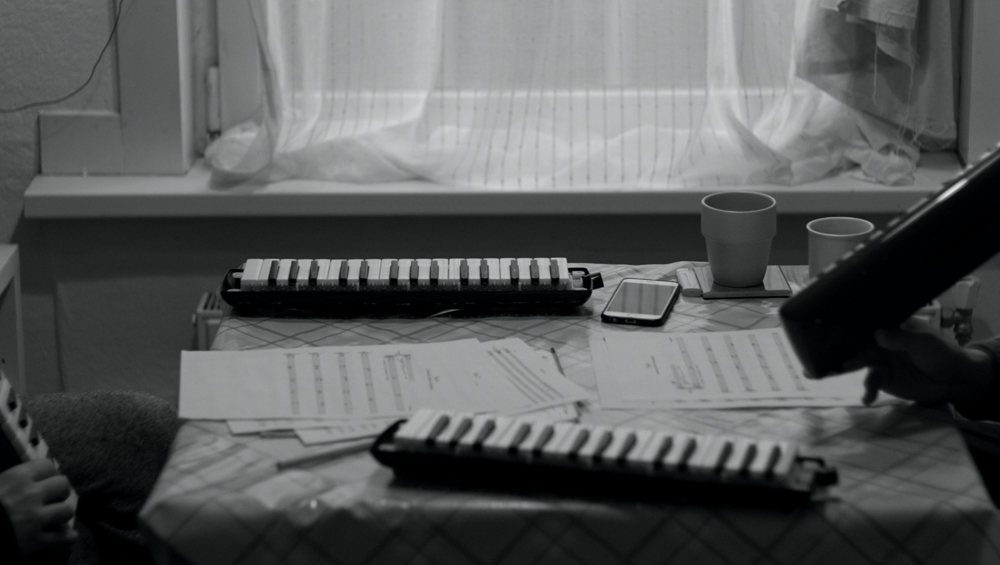
Rehearsing Melodica Duets. Photo by Lam Lai
– You are also known as the initiator and leader of Omega Impact, a group based in The Netherlands. Can you tell me more about Omega Impact and about the sound material you are working with?
Grzegorz Marciniak: ''Omega Impact arose from a need for singing. I was always singing, since I remember. As a boy I was a member of a boys choir for that reason. Singing is very liberating. It gets harder when you get older, but it is still very rewarding if you let yourself do it. And if you can write and perform your own songs, it sparks joy like nothing else. So it all started around 2013 as an acoustic ensemble with me singing through an acoustic megaphone. Then slowly it got more and more electric with an electric bass, synths and mics replacing double bass, harmonium and the megaphone. The latest incarnation of the band is a quartet with drums, synths, clarinet or sax, bass and vocals. I was even considering changing the name of the band because of so many changes in the instrumentarium and personnel, but I was advised not to. So eventually I didn't. I don't think much about any particular sound material or style when I am working on songs, I simply follow inspirations. Sometimes it could be a motive or a mood that I want to turn into a song. Other times it would be a poem I found that evoked some musical ideas. I take each of these ideas separately as independent units and we work out the arrangements together with the band. With the band we are on a level of communication that if we don't like something we just say it without being afraid that it might hurt someone's feelings. So, sometimes it could be like: 'this sounds like s*it, we don't do it', or: 'let's don't do that song, it's too dark, okay?'. And that is a great working environment. It makes you focus on the music instead of anything else. Fun fact: the band originated in The Hague and slowly moved to Brussels, with Jordi Cassagne and Théo Lanau being there at the moment, Hélène Duert in Paris and me in The Hague.''
– Your first release on the label is presenting four of your melodica duets, but I suspect that there are certainly more pieces in this cycle. How many melodica duets exist in the series? Is there a larger or comprehensive connection between the compositions or do they function as small units?
Grzegorz Marciniak: ''There are indeed more melodica duets at different stages of development. Some are actually completed but others are not. I don't know how many there will be in the end, maybe eleven. Every melodica duet deals with a different texture and technique, so as long as I can find new ways of playing the instrument, I will keep writing for it. All duets are composed as independent units that can fit larger forms. The idea is that you could choose to play one or two or more of them as a set. You could also choose to play fragments of it. The ideal performance would be to play the whole set (1-4), but I can imagine that sometimes it is just too much to ask...''
Grzegorz Marciniak: ''Omega Impact arose from a need for singing. I was always singing, since I remember. As a boy I was a member of a boys choir for that reason. Singing is very liberating. It gets harder when you get older, but it is still very rewarding if you let yourself do it. And if you can write and perform your own songs, it sparks joy like nothing else. So it all started around 2013 as an acoustic ensemble with me singing through an acoustic megaphone. Then slowly it got more and more electric with an electric bass, synths and mics replacing double bass, harmonium and the megaphone. The latest incarnation of the band is a quartet with drums, synths, clarinet or sax, bass and vocals. I was even considering changing the name of the band because of so many changes in the instrumentarium and personnel, but I was advised not to. So eventually I didn't. I don't think much about any particular sound material or style when I am working on songs, I simply follow inspirations. Sometimes it could be a motive or a mood that I want to turn into a song. Other times it would be a poem I found that evoked some musical ideas. I take each of these ideas separately as independent units and we work out the arrangements together with the band. With the band we are on a level of communication that if we don't like something we just say it without being afraid that it might hurt someone's feelings. So, sometimes it could be like: 'this sounds like s*it, we don't do it', or: 'let's don't do that song, it's too dark, okay?'. And that is a great working environment. It makes you focus on the music instead of anything else. Fun fact: the band originated in The Hague and slowly moved to Brussels, with Jordi Cassagne and Théo Lanau being there at the moment, Hélène Duert in Paris and me in The Hague.''
– Your first release on the label is presenting four of your melodica duets, but I suspect that there are certainly more pieces in this cycle. How many melodica duets exist in the series? Is there a larger or comprehensive connection between the compositions or do they function as small units?
Grzegorz Marciniak: ''There are indeed more melodica duets at different stages of development. Some are actually completed but others are not. I don't know how many there will be in the end, maybe eleven. Every melodica duet deals with a different texture and technique, so as long as I can find new ways of playing the instrument, I will keep writing for it. All duets are composed as independent units that can fit larger forms. The idea is that you could choose to play one or two or more of them as a set. You could also choose to play fragments of it. The ideal performance would be to play the whole set (1-4), but I can imagine that sometimes it is just too much to ask...''
László Juhász
May 2022
Inexhaustible Editions has just released Szczecin-born and now The Hague-based composer and performer Grzegorz Marciniak's first album presenting four pieces of the composer's Melodica Duets cycle. Interview about the inception and ideas behind the duos for melodicas, their various ways and settings of performing them, how the pieces work, the nature of the instrument itself; about drawing inspiration from karnatic music, and about his group Omega Impact. Eight questions and eight answers with Grzegorz Marciniak.
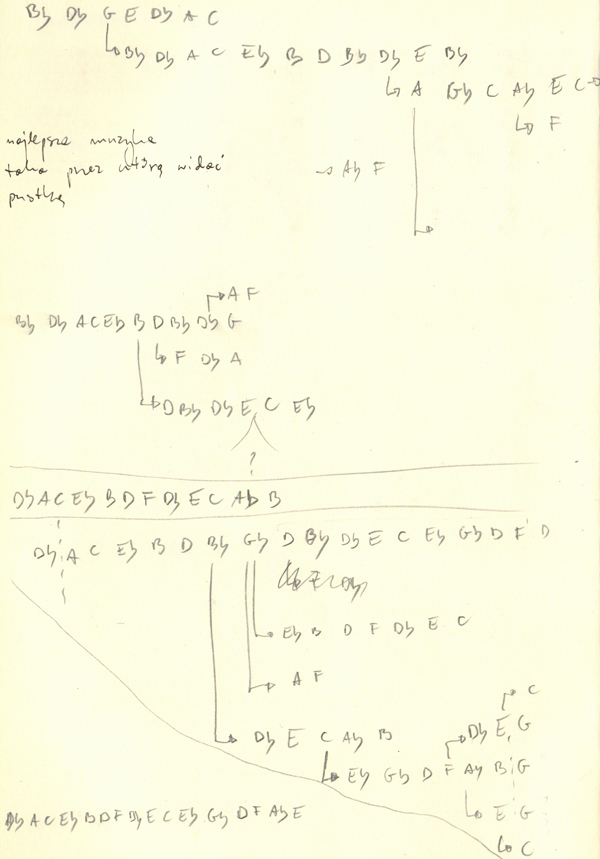
Score draft photo by Grzegorz Marciniak
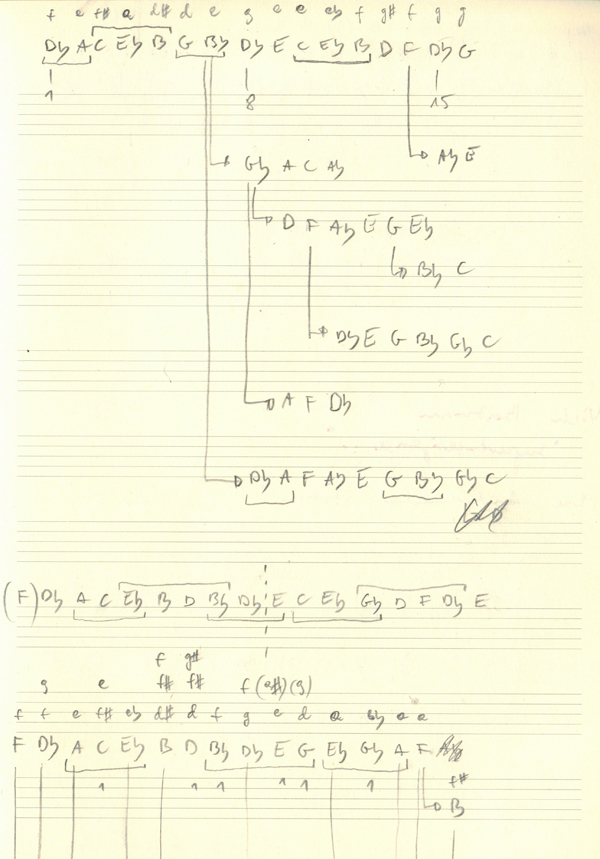
Score draft photo by Grzegorz Marciniak
